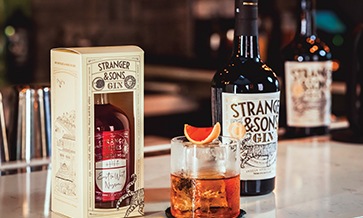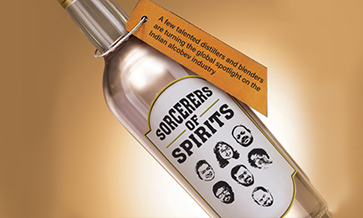The award-winning The Bombay Canteen has raised the bar in many ways: fresh and sustainable sourcing of foodstuff, seasonal and regional fare on the interesting menu, knowledgeable and well-spoken staff at the tables and counters, and an unswerving attention to detail. To find out why his restaurant has caught the imagination of his clientele in an already crowded Central Mumbai suburb, Roy Thomas spoke to its co-founder, Yash Bhanage.
Mumbai is a city of restaurants. It is an acknowledged fact that, given the time- consuming commutes in the metropolis and late working hours, eating out is a necessity, not a luxury. To cater to this demand, literally every road boasts of some eatery of sorts: from hand-drawn carts to canteens to fine-dining restaurants.
As a youngster, Yash Bhanage was fascinated by restaurant crew and managers in their dapper uniforms. He joined the Institute of Hotel Management (IHM) in Goa, and followed it up with a Masters in hospitality from Cornell University’s Hotel School.
Yash soon teamed up with his Cornell classmate, Sameer Seth, a banker whose heart lay in the hotel industry, and the duo set up The Bombay Canteen (TBC) in 2015. It is a restaurant located in the heart of Lower Parel and has since earned the reputation of a place that re-imagines Indian food in a fun way, with emphasis on seasonal produce.
Today, it is a ‘must-go’ place that has won several awards and accolades and has made a name for itself in what is, without doubt, one of the most competitive industry settings in the country. The bar is a great place to hang out and has a unique selection of re-imagined classic cocktails with Indian roots – and each dish and drink has a story to tell!
TBC is a café and bar that is Indian at heart and prides itself on recreating local dishes and reinterpreting age-old Indian traditions, to create an experience that toasts the old times and celebrates the new. The kitchen presents the classic yet unexplored charm of India’s diverse regions, marrying them expertly with familiar flavours.
Cultural cues
It is not easy being nominated as the best restaurant in India in the Conde Nast India awards for 2018. Only two from India have made it to this exclusive club thus far. One of the big contributors to this is a great team that ensures exemplary, all-round service levels.
What is it that defines TBC and makes it what it is? Talking to Yash one can sense tremendous passion that goes beyond it being just a business: for the founders, it is the passion to excel that is the differentiator.
Two of the partners in the venture, Culinary Director and Chef, Floyd Cardoz, and Sameer have had the opportunity to work with Danny Meyer, who is the CEO of Union Square Hospitality group in the US. Danny Meyer, who all the founders of TBC look up to, would always talk of “hospitality first”.
Says Yash: “TBC is a firm believer of ‘hospitality first’ and follows it with great zeal and seriousness. This is the philosophy and culture that has to percolate to the employees first and then pass on to the guest.”
“Danny Meyer has a written a book called Setting the Table, which all our managers are advised to read before they join, so that they can understand the philosophy that underlines all that TBC stands for,” he adds.
Personality traits
The team consists of 80 employees, with an average age of 26, and includes about 20 girls. “The average age would be even less if we do not include the age of the founders,” laughs the young promoter.
Personality forms the main criteria that the company stresses on, especially when it comes to front of house staff like captains and stewards. The emphasis is on people who are able to talk to a guest and hold a conversation, not just relay information.
These people are given extensive menu training, so that they understand and are able to take any questions and answer properly, and have an opinion so that the customer can make informed choices. TBC does not insist that front office staff speak English – even if they can speak in Hindi and hold a conversation, it is good enough.
While hiring staff for the kitchen, for say a sous chef, there is a requirement for some experience with emphasis on the background and company they come from, as it gives an idea of the work culture they have imbibed. Experience with Indian restaurants is, however, discounted because they come with pre-conceived ideas and notions of what they should be doing and how to cook!
Rather the emphasis is on certain character traits like being soft-spoken, honest and humble, and this applies to all recruits. If someone comes with the added experience of having worked in some amazing restaurants then that is additional bonus, says Yash.
Training programme
There is no structured or formal training that is imparted. But, for the front of house for instance, a buddy system is in place where a captain or a steward works as an understudy with a senior while learning the ropes. A check-list of responsibilities is provided, where the both can see and evaluate where they stand as far as the learning curve is concerned.
A manager then follows up with what is called ‘Service Experience Training’. It looks at various touch points that come into play, from the time a guest comes in till the time s/he leaves. The staff is encouraged to gauge the emotions a guest is going through when s/he walks in and looks for a table, and guess why s/he behaves in a certain way.
When a guest is provided with relevant and adequate information, it is good to leave the choice to him/her; that makes the guest feel that the restaurant is there for him/her.
In the kitchen is full of exotic vegetables and indigenous ingredients; and the staff is taught the how, why, and why-not of various things. So, a preparation like the Arbi Tuk (a dish with Arbi - and rat tail radish) has to be actually tasted by them to understand its feel, flavour and texture. Only then can the staff even talk about it to a customer and try to convincingly create a picture of the dish in the mind of the guest.
The reason why a fish like Basa is not used, or the importance on going with regional and seasonal ingredients, or the need for sustainability are all explained in depth. The training experience is an eye-opener for people who come to work at TBC.
Cocktail circuit
The initial training at the bar is very similar in that even the bartender has to understand the restaurant’s culture and philosophy. Staff at the bar is taken through all their job specifics.
There are made to understand why the bar requires fresh lime to be squeezed every day and not poured from a bottle; why no canned juices are used at the bar; and why there is a lot of emphasis on cleanliness and hygiene.
They are prepped on the basics too: how to shake cocktails the right way, dry shake every cocktail, the use of egg white, etc. Finally, the staff is introduced to TBC’s signature cocktails. The restaurant has a cocktail book that lists out their eight speciality drinks. Each cocktail has a story attached to it and is inspired from the Bombay Talkies.
The bar has an interesting mix of four freshers and two experienced bartenders who hand-hold the new hires. Yash notes, “There is a big demand for bartenders. But every bartender, after attending a 6-month course, feels he is the next Tom Cruise (from the 1988 romantic movie Cocktail). They will all learn the hard way that becoming a good bartender needs years of hard work, resilience and a smile!”
It is the attention to detail and the ability to think out of the box that helps TBC stay ahead of the curve. For instance, Indians prefer to have a drink at the table, not the bar. Bartenders are encouraged to make conversation with guests and also give them tasters of various infusions and bar experiments to make them feel comfortable while sitting at the bar.
Dinner is also served at the bar; so the bar team is also required to know the menu, so that s/he could attend to the guest and take orders.
Whenever “bar takeovers” are organised the TBC bar team is given as much exposure as possible. TBC recently did one with ‘Employees Only’ from Hong Kong and ‘Clumsies’ from Athens – both bars rank among the top 50 in the world.
Some bar staff is allowed to travel overseas to understand newer techniques and processes. Recently there were bar takeovers in Singapore and Colombo; and both times members of TBC’s bar team attended the programmes.
While staff is encouraged to attend certification courses, in-house training is also conducted to understand wines better. The team is then able to explain wines to the guests and also entertain them with stories and anecdotes.
Team motivation
A restaurant is a people-driven business and keeping the team motivated is a priority. What is paramount is providing a congenial atmosphere for everyone to work in. People are constantly recognised by giving out measurable awards for say, being punctual, good grooming, guest feedback and other such parameters.
Team celebrations to encourage bonding are conducted on a regular basis. Financial motivation is also important and this is always kept in mind. TBC also organises visits to vineyards and breweries and places which enhance professional learning.
“Attrition is very much a part of our business, but we like to believe that this is low in TBC because of the practices we follow,” says Yash. “We like to think that we empower our employees to take decisions at their individual level. For instance, if some dish has not met customer expectation then they could replace it with something else free of charge.”
If a regular guest asks for a dish that is not on the menu, then the steward could even request the kitchen to see if this can be done as a special case. Such levels of empowerment give the employees a feeling of satisfaction.
A guest recently wrote to TBC: “Hey! Just wanted to let you know your team is fantastic! I asked if the bar would mind an off-menu order, and when they realised they didn’t have any cocktail onions for a Gibson, your bartender went across the street to find some. When she couldn’t find any, she came back and offered me one of those Baklava martinis that were created for the ‘Clumsies’ takeover night. It was delicious!” This then is what TBC is all about.













